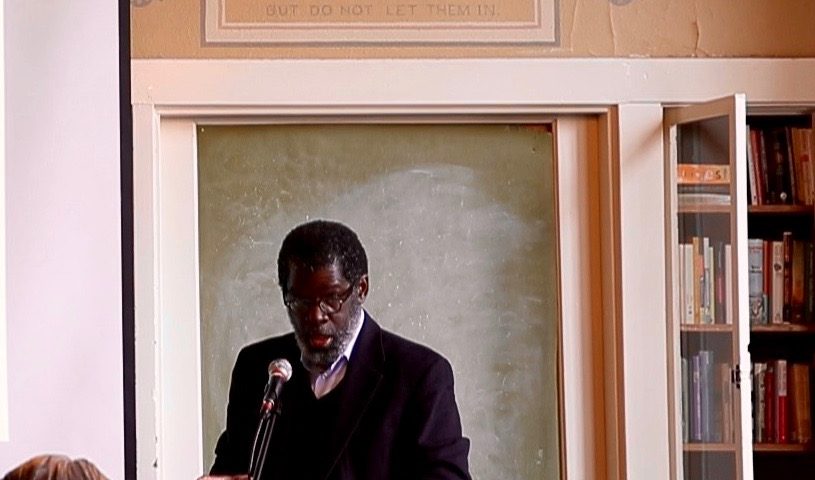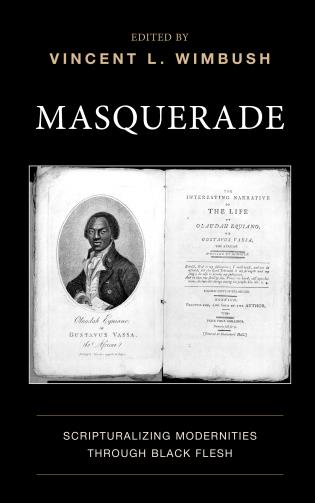
Announcing the First Annual Meeting of the ISS
July 9, 2016
Katie Van Heest Responds to Vincent Wimbush’s: “It’s Scripturalization, Stupid!”
July 9, 2016Vincent Wimbush Responds to the Recent NYT article on ISIL’s “Theology of Rape”: It’s Scripturalization, Stupid!

 The recent article in the NYT (“ISIS Enshrines a Theology of Rape,” August 13, 2015) about the rape of Yazidi girls and women by elements within ISIS and their appeal to the Quran for its justification rendered me at first nearly paralyzed and without words. Only now slowly recovering, I see in the report’s use of the term “theology,” as shorthand for the “narrow and selective reading of the Quran” and handle for the justification for their brutality, a prick and wedge for my own critical analysis of the situation. Although many—within Islamic and other religious circles, within and beyond scholarly circles—might for varied reasons bristle at the application of the term “theology” to what the men of ISIL are reportedly doing with the Quran in relationship to the humiliating sexual violence perpetrated on young women and girls, its use does at least open for me a window through which I might offer a larger challenge in conceptualization and analysis that may in turn offer help in our need to respond.
The recent article in the NYT (“ISIS Enshrines a Theology of Rape,” August 13, 2015) about the rape of Yazidi girls and women by elements within ISIS and their appeal to the Quran for its justification rendered me at first nearly paralyzed and without words. Only now slowly recovering, I see in the report’s use of the term “theology,” as shorthand for the “narrow and selective reading of the Quran” and handle for the justification for their brutality, a prick and wedge for my own critical analysis of the situation. Although many—within Islamic and other religious circles, within and beyond scholarly circles—might for varied reasons bristle at the application of the term “theology” to what the men of ISIL are reportedly doing with the Quran in relationship to the humiliating sexual violence perpetrated on young women and girls, its use does at least open for me a window through which I might offer a larger challenge in conceptualization and analysis that may in turn offer help in our need to respond.
The challenge is related to the attention that has for some time been given to the matter of what exactly to call—and how to understand and respond to—movements such as ISIL, Al-Qaeda, and Boko Haram. What are they as social-cultural and political phenomena? What category or name captures them? The too often unstated assumption, with its accompanying anxieties, is that if we are able to name and figure out who or what they are, we might capture or diminish, if not destroy, such groups. If we can conceptually capture them, determine what label to project onto them, understand from whence they come, how and why they develop into the terrors that our fears and their performances suggest they are, then we might beat them back, if not altogether destroy them.
Evidence that there is much in a name or label is seen in the apoplectic reactions on the parts of some—scrambling political camps and their orientations–to President Obama’s supposed refusal to label strongly and unambiguously ISIL as a cabal of religious, or Islamist, fanatics or terrorists. At least three types of consequential orientations in relationship to Mr. Obama’s gestures are apparent.
First, some seem to think Obama simply wrongheaded—that the category “religion” adequately and poignantly identifies the likes of ISIL. Such a response also happens to feed the historically sedimented, mostly unrecognized, rarely acknowledged, widespread culturalist prejudices held by some in the West against historical and contemporary Islam. In this case, what is played is a zero-sum game: defending one religion (the true one) against another (a threatening untrue one).
Second, some think Mr. Obama correct in refusing to label ISIL and other such headline groups as Islamic. (He prefers “terrorists” or “extremists” as the descriptive category.) Some within this group, so the thinking goes, may be devotees. But wanting to defend “Islam” at all costs, they speak (or do not speak at all) out of apologetics, constructed piety and an understandable sense of anxiety and insecurity. Some others in this camp may have an interest in protecting “religion” in general—or more accurately, the civilizational formations that are the “world religions”—against modern sceptics and detractors. This reaction—associated with the likes of religion scholar Karen Armstrong—registers sensitivities provoked by the long-standing skirmish that comes out of Europe’s arrogation of (its) “enlightenment.” The orientations and sensibilities and politics that define and result from such a claim have consequences that are perduring: among so many other things, they have led to the setting apart and devolution of “religion,” rendering “it” a matter only of piety, limited to and legitimate only in the private sphere, irrelevant and indifferent to the public square or political realm. When religion has from time to time broken out of the small, private cage to which it was assigned by the (Euro-American) enlightened ones, no matter the orientation or impact of the agenda on the larger social and political body, much anxiety has been felt. In the U.S. we can think of the civil rights movement. In Europe Neo-naziism comes quickly to mind.
Third, there are those who feign themselves totally indifferent to, ignorant about, or hostile to religion. Such persons may be given to naming and explaining ISIL and other groups simply as the hopelessly benighted terrorists or, in ironic demonstration of prejudice and entrenchment (fundamentalism, anyone?), run wild—as the religious. They assume no other explanation need be offered.
We can and must do better in our analytics. For language-using, meaning-making animals names, labels, categories are needed, in order to get a handle on everyday situations, and for the sake of honest, difficult and critical analysis of complex issues. “Religion”/“theology” as name or label for political formations such as ISIL and similar bodies, presents a crisis of sorts that cries out for more honest and sustained attention: do we for the sake of recapturing its ambiguous and complex social dynamism—indeed its historical role as the main driver or carrier of social-cultural dynamics—let it out of its cage and identify ISIL and company with it? Or do we in the interest of protecting it from any association with the violence of such groups keep “religion”/”theology” small and tame and innocent? The first response seems to have been the argument—about ISIL as bad religion—made by Graeme Wood in his article, “What ISIS Really Wants,” which appeared recently in The Atlantic. The second response reflects the stance—with some qualification—of Karen Armstrong as is evident in her voluminous apologetic works on the “world religions.” Neither response gets us very far in analysis. Armstrong’s books mostly keep religion locked in and away from the contemporary dynamics. Religion is argued by her to represent some essence that can be rediscovered—from the enlightenment’s banishment—as carriers of peace. The carnage that our headlines report make such arguments seem tortured. Although it “outs” religion and shows it to be dynamic and culpable, Wood’s article does not explain why or how—on what terms, in what respects—this is the case. Simply stating something or someone to be religious, to represent religion, is no explanation of anything in particular. The explanation remains to be dug up. And the identification of the twisted and tortured “reading” of the Quran to provide cover for the rape of young woman and girls with “theology” gets us nowhere—at least not in terms of understanding the dynamic behind the dynamic. “Theology” here serves to continue the obfuscation and mystification. In other words, we have little or no clue about what is really going on.
We need new, sharper categories to help us with sharper critical analysis of the dynamics described in relationship to ISIL and the like-minded that we still haltingly and too facilely call religion or theology. I should like to suggest in lieu of the roiling over religion and theology a set of new categories. To get to them we—including, or perhaps, especially including academics—must abandon the simple-minded polar agenda of apologetics, on the one hand, and that of hostility and lazy indifference, on the other, around the use of the category religion. We should take as useful springboard the type of thinking Mr. Wood’s article represents and the challenge to which the NYT’s piece points. That is, we must take seriously the need for a more expansive and deeper view of the role of the religious in complex situations and dynamics that mark our times in order to come to terms with how “it” works or is made to work. It is not a matter now of trying to find the opposite of religion as explanation; it is more a matter of deeper excavation, of figuring out what we actually mean when we refer to “religion” or what we are observing or experiencing and naming—or silencing—by use of that fraught shorthand.
With this issue in mind I should like to suggest that what we either all too easily or much too anxiously and cautiously call religion or theology can more accurately in terms of social-cultural orientation be termed scripturalism, as ideology that fetishizes writing; and scripturalization, as social-cultural-ideological regime built around the politics of reading and writing. These terms capture the work we now make religion/theology do for and to us. The extent to which we all tend more or less to festishize writing makes all of us—not those people of that other culture or religion—more or less fundamentalists, of different sorts. The terms now beg the trans-disciplinary fathoming—not merely the exegesis of the invented and chosen tribal scriptures—of the invention and uses of the texts, and their consequences. Along with Koran-burning pastor Reverend Terry Jones of Dove World Outreach Center, Gainesville, Florida; along with Jewish Kabbalists in New York City or Israel; the parishioners of First Baptist Church, Dallas, Texas; the vehement Indian defenders of ancient Hindu texts against scholarly interpretation; and Justice Scalia and his reading circle of constitutional originalists—along with these groups, ISIL reflects the ideology of scripturalism, as well as the instantiation of scripturalization (think caliphate, national church, Tea Party, etc.). The latter represents the frameworks within which communications and knowing, politics and meaning, in sum, the fundamentalisms of various types inspired by the politics and social psycho-logics of the written, are structured and managed. All representations, refractions, and practices need to be examined in critical historical and comparative terms.
In sum, with the categories scripturalism and scripturalization we are focused on and oriented to reading the readings. This is the more compelling critical interpretive project for our times, a project that takes us into rather expansive multiple domains—far beyond but including that of enlightenment-defined “religion”—and with the poignancy of the social psychology, the politics and performativity, the violence and human-making results appertaining thereto. Given the carnage and chaos and types of humiliations and violence around the world that beg to be called out, to be fathomed for causes, mutations, representations, effects and ends, I find it hard to resist putting a twist on and directing first to myself and then to readers to consider political strategist James Carville’s self-directed 1992 campaign mantra as provocation and call to reorientation, “It’s scripturalization, stupid!”



